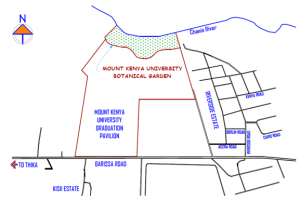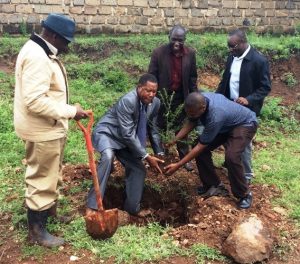Mount Kenya University has embarked on an ambitious project to establish a world class botanical garden over the next 5 years. The Botanic Garden is a collaborative project between the School of Pharmacy and the Directorate of Research and Development. The project which is in line with the Kenya Vision 2030 aims to raise the Kenya forest cover to over 10% for environmental conservation, education, research and development needs.

Mount Kenya University has embarked on an ambitious project to establish a world class botanical garden over the next 5 years. The Botanic Garden is a collaborative project between the School of Pharmacy and the Directorate of Research and Development. The project which is in line with the Kenya Vision 2030 aims to raise the Kenya forest cover to over 10% for environmental conservation, education, research and development needs.
The University intends to develop a botanical garden that will have the most extensive plant diversity in East and Central Africa. The MKU Botanic Garden will serve a bio-conservation function as a section of the garden will be dedicated to the planting of locally endangered plant species. The botanical garden project will also serve as the pillar in which the University will undertake research into climate change and adaptation.
The School of Pharmacy working closely with the Department of Biochemistry in the School of Medicine, and the Directorate of Research will soon be launching undergraduate and postgraduate programmes in bioinformatics (the application of information technology solutions to handle the analysis of biological information in order to obtain insights into biological processes). The faculty spearheading this bioinformatics training will be at the forefront of this bio-conservation; and climate change and adaptation activity through research in biodiversity informatics (the application of technology and information science on biological diversity to study their genes) and bioprospecting (the exploration, extraction and screening of biological diversity and indigenous knowledge for commercially valuable genetic and biochemical resources).
The University intends to partner with governmental, non-governmental organizations, research institutions and other Universities that share a common vision of bio-conservation, and climate change and adaptation. Already, the University is working closely with the Kiambu Government’s, Department of Forestry in the establishment of the Botanical Garden.
The botanical garden will also play a key part as the School of Pharmacy, Department of Pharmacognosy aims to develop and mount undergraduate and postgraduate programmes in herbal and Complementary/Alternative medicine. The medicinal plants in the botanical garden will be key in the practical sessions of the herbal medicine preparation.

On 30th April 2015, the School of Pharmacy in conjunction with the MKU Directorate of Research and Development and the MKU Innovation platform (MKUIP) planted over 1,000 medicinal plants including 500 seedlings of Moringa oleifera, 300 seedlings of Prunus africana, 200 seedlings of Warbugia ugandensis, over 100 seedlings of Olea africana, Vitex keniense and other unique plant species including Uvariodron anisatum, and Hypericum keniense.
The Chief Guest for this tree planting exercise was Professor Nicholas Kamindu Gikonyo, a Professor of Pharmacognosy at the Department of Pharmacy and Complementary/alternative Medicine, Kenyatta University. Professor Gikonyo commended the University for such a big and worthy investment. He said that it shall be necessary to consider planting all types of plants even poisonous plants instead of concentrating only on medicinal plants, because poisons are medicines too when given in the right doses.
Professor Gikonyo in his speech also advised the University to include aesthetic plants which will add great value to the garden and asked that the University to consider making the botanical garden a full ecological system by keeping bees and small relevant animals that matter. Bees besides producing honey which is also considered medicinal, are critical for the pollination of plants. The tree planting function was also attended by representatives from the Kiambu County, Department of Forestry and the National Museums of Kenya.
The Coordinator for the University Botanical Garden, Mr. Jared Misonge said that they aim to enter into partnerships with other interested learning and research institutions. Already, students from institutions such as the Kenya Medical Training College (Mombasa and Nyeri Campus) have visited the Botanical Garden and individual students have done research at the botanic garden for their research projects. He also noted that currently there are two Bachelor of Pharmacy students undertaking their research at the botanical garden.


